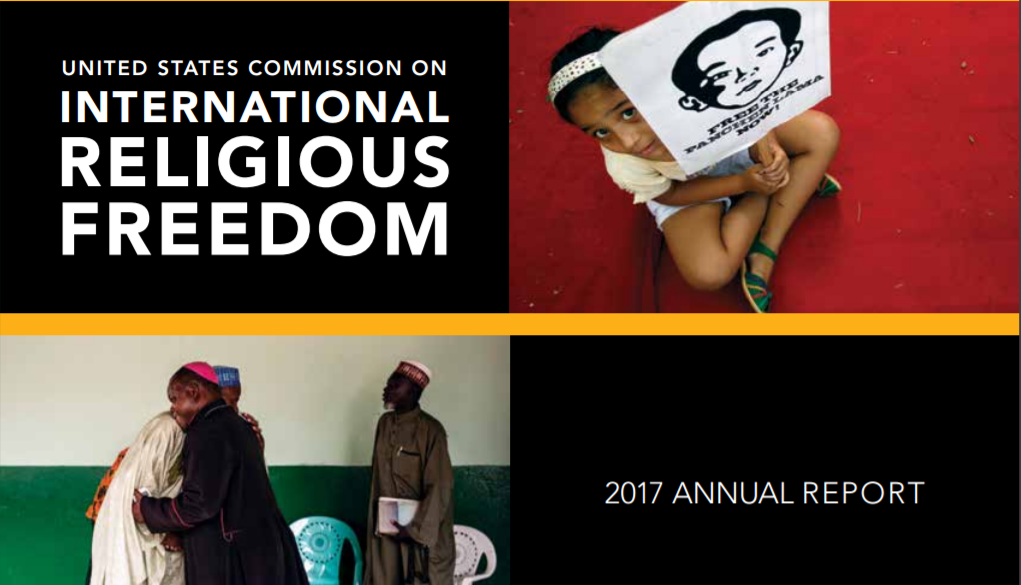26 April 2017 – The United States Commission on International Religious Freedom (USCIRF) has today released its 2017 Annual Report, categorizing Bahrain as a Tier 2 country for the first time “due to deteriorating religious freedom conditions.” Americans for Democracy & Human Rights in Bahrain (ADHRB) welcomes USCIRF’s continued documentation of religious discrimination in Bahrain and its decision to reflect the recent intensification of these abuses in the kingdom’s new ranking. We further support USCIRF’s recommendations to the United States Government, particularly those to press at the highest levels for the release of prisoners of conscience and religious advocates, and to cease the targeting of individuals on the basis of religious belief or human rights advocacy. We additionally call on the Government of Bahrain to take all necessary steps to protect religious freedom and to lift restrictions on the right to free belief.
In its report, USCIRF finds that “amidst an overall worsening of human rights conditions during the past year, religious freedom for the majority-Shi’a community deteriorated.” Throughout 2016, the Bahraini government oversaw an increased campaign of judicial harassment targeting Shia clerics, “mostly on unfounded or unsubstantiated charges,” and arbitrarily interfered in their ability to conduct religious services. USCIRF noted that this spike in religious freedom violations is situated within longstanding forms of structural discrimination against the Shia community, including unequal access to public services and employment as well as the normalization of “inflammatory, sectarian” discourse in pro-government media.
More broadly, USCIRF also stressed that the Government of Bahrain has largely failed to implement the recommendations of the Bahrain Independent Commission of Inquiry (BICI), especially those “that would redress past abuses against Shi’a Muslims and further improve religious freedom conditions.” Despite the government’s claim to have fully rebuilt all Shia religious sites destroyed in 2011, for example, USCIRF finds that the government completed the reconstruction of only 20, and that the Shia community itself rebuilt seven.
As a result of these violations, USCIRF raised Bahrain to the Tier 2 country list for the first time, which it defines as a set of “nations in which the violations engaged in or tolerated by the government are serious and characterized by at least one of the elements of the ‘systematic, ongoing, and egregious’ CPC [Country of Particular Concern] standard.” Tier 2 is one level below the CPC designator, the latter of which, if recommended by USCIRF and accepted by the US State Department, can carry significant sanctions for the designated country under the International Religious Freedom Act.
USCIRF expresses additional concern that restrictions on religious freedom are often “done under the guise of protecting national security” in countries like Bahrain, and that this has driven counterproductive US policies: “During the year, the Bahraini government has increasingly cracked down on the religious freedom of its majority-Shi’a Muslim population, yet the U.S. Administration is lifting human rights conditions on the sale of weapons to Bahrain.” Among other recommendations, USCIRF calls on the US Government to work at the “highest levels” to secure the release of prisoners of conscience in Bahrain; address publicly and privately religious freedom concerns with the Bahraini government; press for the implementation of the BICI recommendations and issue annual assessments of implementation progress.
“The Bahraini government commonly portrays itself as a champion of tolerance and pluralism, but it has for decades discriminated against the country’s majority Shia community and tried to silence human rights defenders – of any faith – who document these abuses,” said Husain Abdulla, Executive Director of ADHRB. “USCIRF’s welcome decision to designate Bahrain a Tier 2 country comes during a new wave of religious freedom violations, and it demonstrates that the international community is watching as the Bahraini government drives this deterioration. Now it is up to the US government to implement USCIRF’s recommendations and hold the Bahraini authorities to their obligations to eliminate discrimination and implement reforms that genuinely promote pluralism and free belief.”
For more information, see ADHRB’s two-volume report on religious discrimination in Bahrain, Apart in Their Own Land I and II, and our assessment of Bahrain’s implementation of United Nations Universal Periodic Review recommendations to eliminate discrimination in Bahrain’s Third Cycle UPR.





